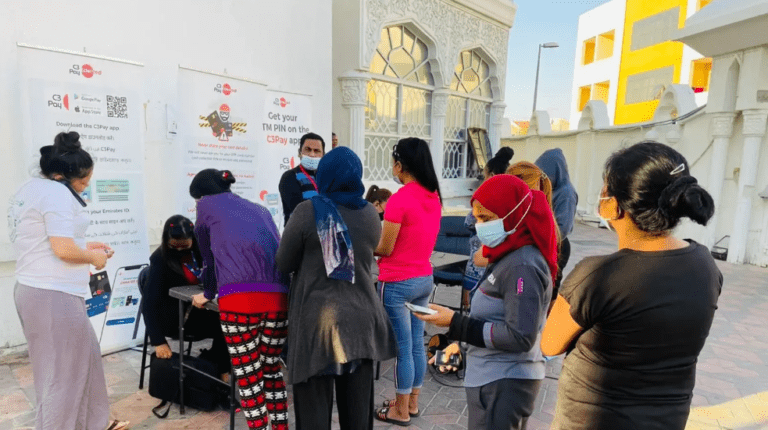RAKBANK and Edenred’s Collaboration to Advance Digital Remittance Solutions
UAE – The United Nations Capital Development Fund (UNCDF) has joined forces with RAKBANK and Edenred to enhance access to and utilization of digital remittance channels through C3Pay, Edenred’s digital wage payment solution. This partnership aims to provide a more accessible and efficient financial service for blue-collar migrants in the UAE, leveraging UNCDF’s expertise in market research, business strategy, transaction data analysis, and the design of migrant-centric and gender-smart products. This blog delves into critical insights derived from over a million transaction records, focusing on the use of digital remittances and financial services to build long-term resilience for migrants.
1. Access to Digital Remittances
Data analysis from Edenred reveals key factors influencing migrants’ access to and use of digital remittances, including demographics, customer preferences, and transaction costs. In the UAE, 64 percent of migrant workers are employed in blue-collar jobs (according to the UAE’s 2019 Labour Force Survey). Male migrant workers are distributed across various occupations, with a significant number in craft-related roles. In contrast, female migrant workers predominantly occupy elementary positions.
Nearly 50 percent of Edenred’s C3Pay cardholders work in the manufacturing and construction sectors, which typically employ fewer women. Moreover, the gender distribution of migrant workers varies significantly across different regions. For instance, customers from Bangladesh, India, and Pakistan are predominantly male, whereas women make up over half of the customers from the Philippines. Over 60 percent of migrant workers in the UAE earn less than $1,360 per month (AED 5,000), and many still prefer exchange houses and informal networks for remittances. In 2019, the Central Bank of the UAE reported that $36 billion was sent through exchange houses compared to $9.3 billion via banks.
The preferences of recipients often dictate the choice of remittance channels. For example, high percentages of recipients in Nepal and the Philippines prefer cash pick-up options over bank transfers, likely due to the ease and control cash provides.
Transaction frequency analysis shows that men and women use different transaction bands almost equally. However, sending cash remittances to the Philippines can be more expensive than bank transfers.
2. Usage of Digital Remittances
The COVID-19 pandemic had a significant impact on the adoption of digital remittance services. Initially, experts anticipated a decline in remittances, but the opposite happened as account openings increased. The UAE government’s temporary movement restrictions and the suspension of UAE Exchange’s license by the Central Bank of the UAE likely accelerated the shift from cash to digital remittances, boosting the use of the C3Pay app among migrants.
3. Financial Inclusion and Resilience
The volume of remittances sent through C3Pay has increased as migrants frequently send money to support their families amid the pandemic’s challenges. There remains an opportunity to further enhance financial inclusion and resilience for migrants. Edenred has laid the groundwork for digital wage payments through C3Pay and can now expand services to include savings, digital credit, insurance, and pensions based on customer needs.
Next Steps
UNCDF is collaborating with RAKBANK and Edenred to fully realize the benefits of financial inclusion for migrants by:
- Enhancing Digital Inclusion: Since the project’s inception, Edenred has added over 200,000 customers to the C3Pay app, facilitating around $272 million in remittances. The number of women using digital remittances through C3Pay has nearly doubled, with additional women field and telesales agents onboarded.
- Promoting Women’s Financial Inclusion: Edenred is implementing gender-smart initiatives to encourage female participation in remittances and build a business case for women’s financial inclusion.
- Incorporating Migrant Feedback: By conducting action-based market research, UNCDF aims to better understand migrants’ circumstances, goals, and challenges to ensure that product design and development meet their needs and aspirations.


